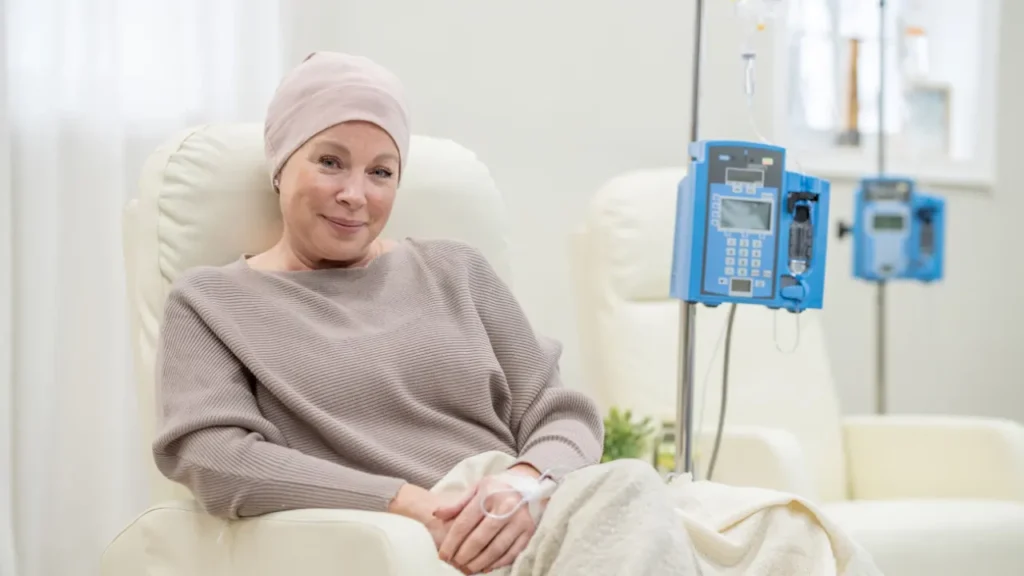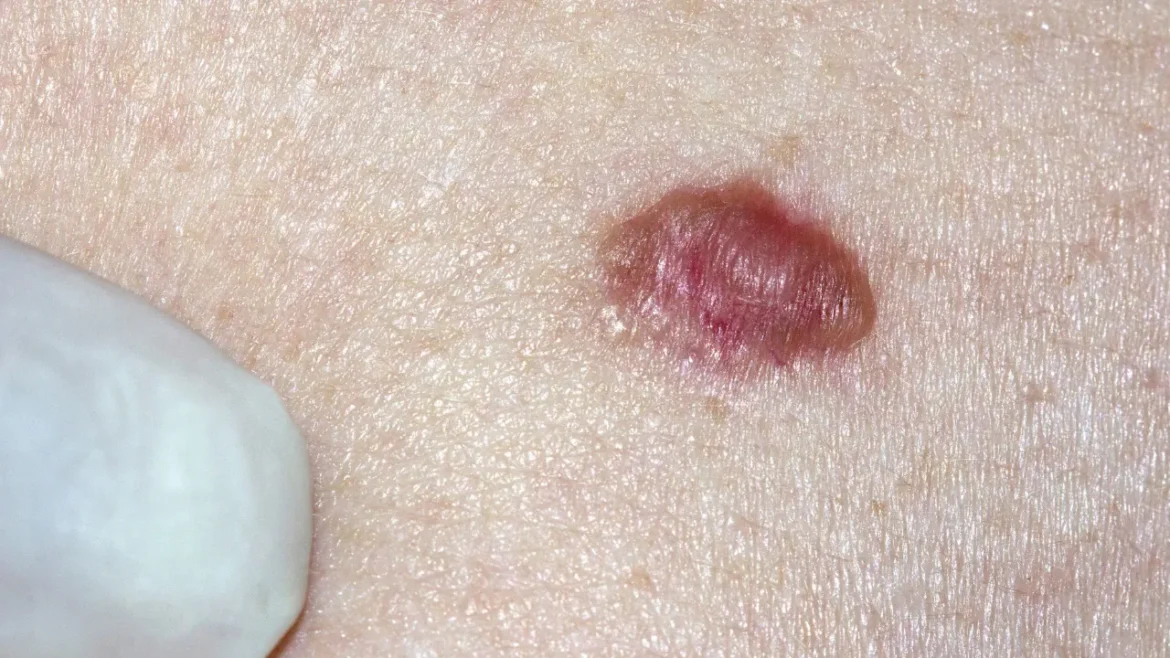The Nature of Merkel Cell Carcinoma
Description
Merkel cell carcinoma (MCC), a rare and serious neuroendocrine skin cancer that primarily affects older people. MCC frequently occurs on sun-exposed skin, such as the arms, neck, and head. Early identification and treatment are crucial for successful outcomes in MCC due to its rapid development and high propensity for metastasis. Merkel cells, which play a role in sensory perception and are found in moderation in the outermost layer of one’s skin, are the cause behind Merkel cell cancer.
MCC’s exact cause is unknown; however, it is associated with a number of risk factors, such as advanced age, immunosuppression, exposure to sunlight, and particular viral infections, such as Merkel cell polyomavirus. This article will help educate you on MCC to help you be aware of and/or take steps to treat this condition.
You May Also Like:
BPD INSOMNIA: 7 STRATEGIES FOR A RESTFUL NIGHT’S SLEEP
CAN’T SLEEP? WHY NATURAL SUPPLEMENTS MAY BE THE ANSWER
Merkel Cell Carcinoma: Description, Causes, And Treatment Protocol is an original (HealthXWire) article.
Possible Causes
It is unclear what causes Merkel cell cancer specifically. Nevertheless, a few factors have been noted as probable drivers of its growth including:
Exposure to Ultraviolet (UV) Radiation: The probability of MCC is significantly increased by prolonged and severe ultraviolet radiation exposure, particularly from sunshine or tanning beds. Individuals with fair skin with previous experiences of sunburns or work exposure to sunlight are more vulnerable.
Advanced Age: With an average diagnosis age in the 70s, elderly persons are mostly often affected by MCC. Although it may happen in younger people, too, the chance of acquiring MCC rises with age.
Immunodeficiency: MCC is more likely to occur in people with compromised immune systems, like organ transplant patients or people living with HIV/AIDS. A weak immune system might be less capable of regulating the development of aberrant cells, making MCC more likely to arise.
Merkel Cell Polyomavirus (MCV) Infections: Many people possess Merkel cell polyomavirus within their skin without experiencing any symptoms. Nevertheless, under some circumstances, the virus can bind to Merkel cells’ DNA, causing uncontrolled development of cells and the emergence of MCC. Generally, most MCC patients have MCV infections.
Exacerbating & Mitigating Factors of Merkel Cell Carcinoma
Exacerbating factors of this condition are:
Immunosuppression: People who have weakened immune systems, whether as a result of illness or immunosuppressive drugs, are prone to acquire more severe MCC.
Tumor Stage and Size: The prognosis is worsened by larger tumors alongside more advanced phases of MCC. The likelihood of metastasis and recurrence is increased in tumors that have already spread to distant organs or surrounding lymph nodes.
Recurrence: Even with a successful cure, MCC has a high risk of coming back. Recurrent cases of MCC can have a worse prognosis with each instance and each subsequent incidence is frequently harder to cure than the previous.
Mitigating factors of MCC are:
Routine Skin Examinations: Regular self-inspections and dermatologist consultations for thorough skin examinations are essential for the early diagnosis of MCC. Treatment results can be improved by early detection and action.
Sun Protection: MCC can be prevented, especially in people with fair skin, by practicing sun protection techniques like wearing protective clothes, routinely applying sunscreen, and finding shade during high sun hours.
Timely Treatment: Seeking medical help as soon as you observe any unusual skin changes, which means the emergence of newly developed or altering lesions, may result in an accurate diagnosis and therapy, increasing the possibility of a favorable result, including a full recovery.
Healthy Lifestyle: The risk of having MCC may be decreased by leading a healthy lifestyle that includes a balanced diet, frequent exercise, and abstaining from tobacco along with excessive alcohol intake.

Standard Treatment Protocol for Merkel Cell Carcinoma
Merkel Cell Carcinoma is often treated with a multidisciplinary approach based on the patient’s specific disease stage, general health, and other considerations. The main kinds of treatment for MCC are comprised of:
Surgery: The cornerstone of therapy for localized MCC is surgical excision which entails removing the tumor in addition to an outer layer of healthy tissue. Different surgical procedures, including Mohs micrographic surgery, extensive local excision, along with lymph node dissection, can be used, according to the dimensions and positions of the tumors.
Chemotherapy: In events of late-stage or metastatic MCC, chemotherapy might be utilized, particularly if immunotherapy seems not a possibility. Targeting cancer cells that divide quickly and assisting in disease management are prominent uses for chemotherapy medications like etoposide and cisplatin.
Radiation Therapy: If a person cannot have surgery, radiation therapy can be utilized as the main treatment or as an adjunct following surgery. It entails locating and eliminating cancer cells employing X-rays with high energies or other types of radiation. Radiation therapy might cure local lymph nodes alongside lower the likelihood of local recurrence.
Immunotherapy: Treatment for late or metastatic MCC has been transformed by immunotherapy. Monoclonal antibodies, known as checkpoint inhibitors, like avelumab and pembrolizumab, work by preventing the interaction of specific immune checkpoint proteins (PD-L1/PD-1) with cancer cells. This boosts the immune system’s ability to fight off the tumor. In MCC, patients treated with immunotherapy show encouraging improvements in general survival along with progression-free rates of survival.
Targeted Therapies: Molecular mechanisms involved in MCC development and proliferation are particularly inhibited by targeted treatments. Advanced MCC can now be treated with cemiplimab, a targeted medication that targets the PD-1 pathway.


Treatment Options for Merkel Cell Carcinoma
There are various options for treating Merkel cell carcinoma besides the usual regimens that include:
Palliative Care: For those who have late-stage or metastatic MCC, palliative treatment focuses on symptom alleviation and enhancing quality of life. It includes controlling discomfort, attending to psychological and emotional requirements, and offering supportive care.
Clinical Trials: Participating in clinical trials may provide patients access to cutting-edge therapies and experimental treatments that could help MCC patients have better outcomes. Clinical trials assess novel medications, pharmacological combinations, and therapeutic philosophies.
Targeted Radiopharmaceutical Therapy: Targeted radiopharmaceutical treatments, like Actinium-225 or Lutetium-177 dotatate, have recently displayed potential in the treatment of severe MCC by delivering radiation onto cancer cells.
When treating cancer, especially Merkel cell carcinoma (MCC), nutritional supplements may prove supportive of overall wellness and health. The usage of nutritional supplements ought to be reviewed with healthcare providers and not regarded as the main course of treatment for MCC. The following are some nutritional supplements that might be considered:
- Antioxidant Vitamins
Vitamins that may reduce oxidative stress and strengthen the immune system include vitamin E, vitamin C, and beta-carotene, i.e., a precursor of vitamin A. Nevertheless, high-dose supplements of antioxidants must be used cautiously during cancer therapy as they may impair the efficacy of several medicines.
- Vitamin D
The immune system and bone health both benefit from adequate vitamin D levels.It is generally advised to maintain ideal vitamin D levels from nutritional intake and exposure to sunlight.
- Omega-3 Fatty Acids
Fish oil supplements frequently contain omega-3 fatty acids because of their anti-inflammatory and potential immune-supportive qualities. They could increase treatment tolerance, minimize inflammation, and be good for general health.
- Protein Supplements
During cancer therapy, maintaining a sufficient protein diet is essential for promoting healing, preserving muscle mass, and bolstering the immune system. For ensuring sufficient protein intake, you may consider taking protein supplements like plant-based protein or whey protein powders.
- Probiotics
Probiotics are good microorganisms that promote immunological and gastrointestinal health. They might aid in reducing gastrointestinal side effects of the medication, like nausea or diarrhea. You could consider probiotic supplements alongside fermented foods including sauerkraut or yogurt.
Natural and herbal remedies: Several medical problems, including cancer, have recently been studied as potential adjuvant therapy using natural and herbal treatments. Bear in mind that inadequate study has been conducted to evaluate the safety and efficacy of such treatments for MCC. The following includes some recommended herbal and natural treatments; however, their applications should be addressed with a healthcare professional:
- Curcumin
The key ingredient in turmeric, curcumin, has shown potential anticancer properties in a number of cancer types. According to some research, curcumin may stop MCC cells’ development and cause cell death.
- Green Tea Extract
Green tea contains polyphenol epigallocatechin gallate (EGCG), which has antioxidant and maybe anticancer properties. Studies have shown how green tea extracts can block MCC cells when used in laboratory settings.
- Resveratrol
A naturally occurring substance, resveratrol, is present in foods including berries, grapes, and peanuts. It’s possible anti-cancer qualities have been researched. According to certain preclinical research, resveratrol may stop MCC cells from proliferating.
- Mushroom Extracts
Shiitake, reishi, and maitake mushroom extracts are only a few examples of mushrooms whose constituents have been examined for potential anticancer properties. The anti-inflammatory and immune-modulating characteristics of these mushrooms.
- Astragalus
In conventional Chinese medicine, the astragalus root is a common plant. Additionally, it contains antioxidant and immunomodulatory qualities. For their possible anticancer properties, astragalus preparations have been researched.
Natural and herbal medicines should be used cautiously because they may interact negatively with other treatments or have unfavorable side effects. Under the supervision of medical specialists, they should be utilized as additional therapies rather than as a replacement for conventional medical therapy. Furthermore, the standardization and quality of herbal and natural remedies can differ, so it is critical you find reliable sources and speak with a healthcare professional before using them to assure your safety.


Merkel Cell Carcinoma:
Conclusion
Merkel Cell Carcinoma symptoms can be abated by a variety of traditional and natural treatments. Regardless of your treatment plan, it is important for your health and survival to develop and maintain healthy lifestyle choices, including regular consultations with your trusted health care professionals about MCC and other conditions. If you are an older person or participate in some of the behaviors that are more likely to bring about MCC, please reference this article and other resources to help you stay safe and learn about your options.


References:
- “Skin Cancer Types: Merkel Cell Carcinoma Signs & Symptoms.” Retrieved from: https://www.aad.org/public/diseases/skin-cancer/types/common/merkel-cell/symptoms
- “Merkel Cell Carcinoma Treatment (PDQâ) – Patient Version.” Retrieved from: https://www.cancer.gov/types/skin/patient/merkel-cell-treatment-pdq
- “Merkel cell carcinoma (MCC).” Retrieved from: https://www.cancerresearchuk.org/about-cancer/neuroendocrine-tumours-nets/merkel-cell-skin-cancer
- “Merkel Cell Carcinoma Overview.” Retrieved from: https://www.skincancer.org/skin-cancer-information/merkel-cell-carcinoma/
Important Note: The information contained in this article is for general informational purposes only, and should not be construed as health or medical advice, nor is it intended to diagnose, prevent, treat, or cure any disease or health condition. Before embarking on any diet, fitness regimen, or program of nutritional supplementation, it is advisable to consult your healthcare professional in order to determine its safety and probable efficacy in terms of your individual state of health.
Regarding Nutritional Supplements Or Other Non-Prescription Health Products: If any nutritional supplements or other non-prescription health products are mentioned in the foregoing article, any claims or statements made about them have not been evaluated by the U.S. Food and Drug Administration, and such nutritional supplements or other health products are not intended to diagnose, treat, cure, or prevent any disease.
Table of Contents


